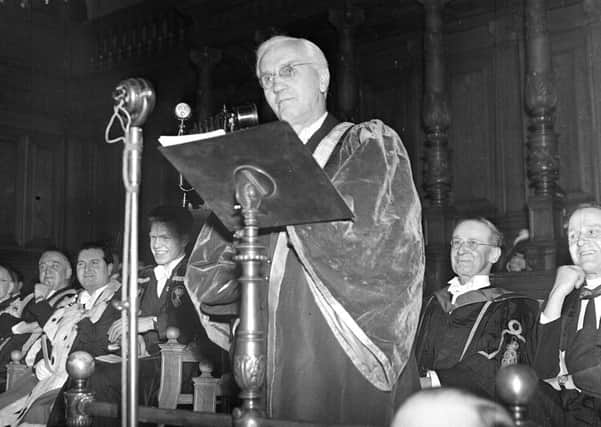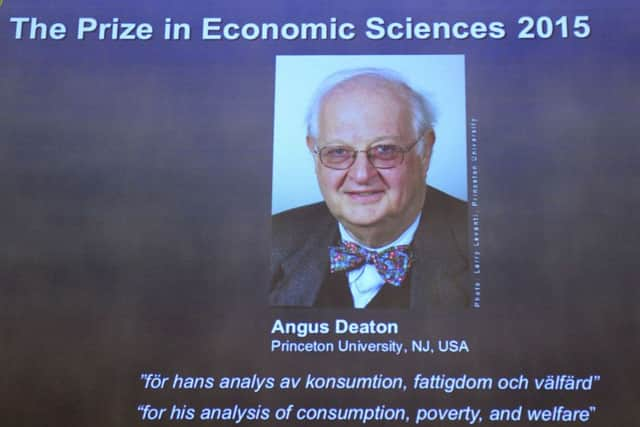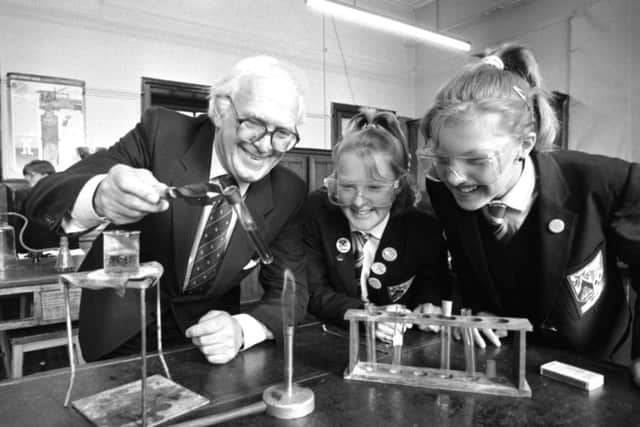Scotland’s 10 Nobel Prize winners


Angus Deaton (2015)
This years winner of the Nobel Prize for Economics, Angus Deaton won for his work on health, wellbeing, and economic development. He is currently a professor of professor of economics and international affairs at Ivy League university Princeton, USA.
Sir James Alexander Mirrlees (1996)


Born in Minnigaff, Kirkcudbrightshire, Mirrlees was educated at the University of Edinburgh and graduated with an MA in Mathematics and Natural Philosophy in 1957. He also studies at Trinity College, Cambridge and one contemporary, Quentin Skinner, has suggested that Mirrlees was a member of the Cambridge Apostles - a secret society at Cambridge University. He taught at the University of Oxford from 1969 to 1995, and it was here that he published papers on economic models for which he was awarded his Nobel Prize for Economics on.
Sir James Black (1988)
Advertisement
Hide AdWinning the Nobel Prize for Medicine, Sir James Black’s work lead to the development of the beta blockers propranolol, and cimetidine for the treatment of heart disease and stomach ulcers respectively.
Brought up in Fife and educated at Beath High School, Cowdenbeath, at the age of 15 Sir Black won a scholarship to the University of St Andrews.Coming from a mining family, he had been too poor to attend university and was persuaded to sit the St Andrews entrance exam by his maths teacher at Beath.


Alexander Robertus Todd, Baron Todd of Trumpington (1957)
Winning the Nobel Prize for Chemistry for research on the structure and synthesis of nucleotides, nucleosides, and nucleotide coenzymes, Baron Todd was was born in Glasgow on October 2, 1907. Educated at Allan Glen’s School and Glasgow University, where he took his B.Sc. degree in 1928 and, after a short initial research training with T.S. Patterson he proceeded to the University of Frankfurt-on-Maine. Here he studied under W. Borsche and obtained his Ph.D. (Dr.Phil.nat.) in 1931 for a thesis on the chemistry of the bile acids.
John Boyd Orr, 1st Baron Boyd-Orr (1949)
Lord Boyd Orr won the Nobel Peace Price for advocating a world food policy based on human needs rather than trade interests.
Born in Kilmaurs, Ayrshire, his father, R.C. Orr, was a pious and intelligent man whose sudden enthusiasms led to frequent reversals of fortune, but, although his finances were often depleted, he and his wife and their seven children enjoyed a pleasant life in their rural community.
His first encounters with poverty were as an undergraduate in Glasgow when he roamed the interior of the city, usually at weekends. He was shocked by what he found in the poverty-stricken slums and tenements, which then made up a large part of the city.
Advertisement
Hide AdThis lead to his interest in human nutrition, where he eventually won his Nobel.
Sir Alexander Fleming (1945)
Sir Fleming won the Nobel Prize in Physiology or Medicine as a joint award with Howard Florey and Ernst Boris Chain.
Advertisement
Hide AdBorn in August 1881 at Lochfield farm near Darvel, Ayrshire, Sir Alexander Fleming went to Loudoun Moor School and Darvel School, and earned a two-year scholarship to Kilmarnock Academy before moving to London, where he attended the Royal Polytechnic Institution.
His discovery of the enzyme lysozyme in 1923 and the antibiotic substance penicillin from the mold Penicillium notatum in 1928, lead him to win his Nobel Prize.
Arthur Henderson (1934)
Nobel Peace Prize winner Arthur Henderson worked with the World League of Peace and chaired the Geneva Disarmament Conference.
Born in Anderston, Glasgow, Mr Henderson went on to become the first Labour cabinet minister, serving three separate terms as Leader of the Labour Party in three different decades. Popular among his colleagues, he was fondly called “Uncle Arthur” in acknowledgement of his integrity, his devotion to the cause and his imperturbability. He was a transitional figure whose policies were, at first, close to those of the Liberal Party, and the trades unions rejected his emphasis on arbitration and conciliation, and thwarted his goal of unifying the Labour Party and the trades unions.
John J R MacLeod (1928)
A Scottish biochemist and physiologist, John MacLeod was born in Clunie, near Dunkeld.
Awarded a joint Nobel prize in Physiology or Medicine with Frederick Banting as the co-discoverers of insulin, he devoted his career to diverse topics in physiology and biochemistry, but was chiefly interested in carbohydrate metabolism.
Advertisement
Hide AdBeing awarded the prize to Macleod was controversial at the time, because according to Banting’s version of events, Macleod’s role in the discovery was negligible. It was not until decades after the events that an independent review acknowledged a far greater role than was attributed to him at first.
Charles Thomson Rees Wilson (1927)
Winner of the Nobel Prize in Physics, Charles Wilson was born in the parish of Glencorse, Midlothian.
Advertisement
Hide AdA Scottish physicist and meteorologist, he became particularly interested in meteorology, and in 1893 he began to study clouds and their properties. Working for some time at the observatory on Ben Nevis, he made observations of cloud formation and then tried to reproduce this effect on a smaller scale in the laboratory in Cambridge, expanding humid air within a sealed container. He later experimented with the creation of cloud trails in his chamber caused by ions and radiation, leading to the invention of the cloud chamber.
Sir William Ramsay (1904)
Born in Glasgow Sir William Ramsay was a chemist who discovered the noble gases and received the Nobel Prize in Chemistry in 1904 “in recognition of his services in the discovery of the inert gaseous elements in air”.
Along with his collaborator, Lord Rayleigh, the two men identified argon, and Ramsay investigated other atmospheric gases. His work in isolating argon, helium, neon, krypton and xenon led to the development of a new section of the periodic table.